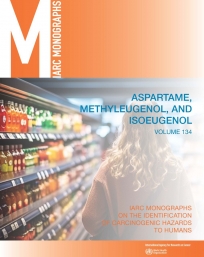
978-92-832-0173-1
978-928 -932-0291-2
View The Lancet Oncology summary as HTML or PDF
French version of The Lancet Oncology summary (hosted by Centre Léon Bérard)
Read the Joint summary of findings for aspartame
Read the Q&A for methyleugenol and isoeugenol
View the infographic
Read IARC Featured News
This volume of the IARC Monographs provides evaluations of the carcinogenicity of three agents: aspartame, methyleugenol, and isoeugenol.
Aspartame is a low-calorie artificial sweetener that has been widely used in foods and beverages since the 1980s. Historically, artificially sweetened beverages have been the major source of exposure to aspartame, but to a lesser extent at present since aspartame is typically used in mixtures with other sweeteners. The highest concentrations of aspartame are found in tabletop sweeteners, chewing gums, and food supplements. Other sources include cosmetics and medicines.
Methyleugenol is a flavour and fragrance compound that occurs naturally in essential oils of various plants. It is used in cosmetics and personal care products and as an insect attractant. Although its use as a flavouring agent is prohibited in the European Union and the USA, it is still present in various foods and consumer products due to its natural occurrence in herbs and spices. The general population is ubiquitously exposed through the ingestion of food or use of personal care products.
Isoeugenol is a fragrance and flavour compound that occurs in many plant species and in wood smoke. It is used in food, cosmetics, household products, animal feed, and veterinary medicines. Firefighters and workers involved in isoeugenol synthesis or handling isoeugenol-containing products may be exposed.
An IARC Monographs Working Group reviewed evidence from epidemiological studies, cancer bioassays in experimental animals, and mechanistic studies to assess the carcinogenic hazard to humans of exposure to these agents and concluded that:
Cover (updated 12 September 2024)
List of Participants (updated 12 September 2024)
General Remarks (updated 12 September 2024)
Aspartame (posted 29 April, updated 12 September 2024)
Methyleugenol (posted 12 September 2024)
Isoeugenol (posted 12 September 2024)
List of Abbreviations (updated 12 September 2024)
ANNEX 1. Supplementary material for Section 1, Exposure Characterization (updated 12 September 2024)
These supplementary tables are available online only.
Please report any errors to imo@iarc.who.int.
Aspartame
Table S1.1 Reported occurrence of aspartame in food
The following tables were produced in draft form by the Working Group and were subsequently fact-checked but not edited:
Aspartame
Isoeugenol
ANNEX 3. Supplementary material for Section 2, Cancer in Humans
ANNEX 4. Supplementary material for Section 4, Evaluation of high-throughput in vitro screening data (updated 12 September 2024)
These supplementary online-only tables contain summaries of the findings (including the assay name, the corresponding key characteristic, the resulting “hit calls” both positive and negative, and any reported caution flags) for those chemicals evaluated in the present volume that have been tested in high-throughput screening assays performed by the United States Environmental Protection Agency (US EPA) and the United States National Institutes of Health. The results were generated by the Working Group using the software “kc-hits” (key characteristics of carcinogens – high-throughput screening discovery tool) available from https://gitlab.com/i1650/kc-hits.git (Reisfeld et al., 2022), using the US EPA Toxicity Forecaster (ToxCast) assay data and the curated mapping of key characteristics to assays available at the time of the evaluations performed for IARC Monographs Volume 134. Data were available for aspartame, methyleugenol, and isoeugenol.
Please report any errors to imo@iarc.who.int.